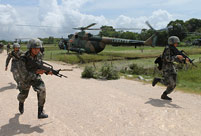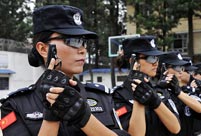WASHINGTON, Sept. 1 -- U.S. President Barack Obama called over the weekend for a Congressional vote on a limited military strike against embattled Syria, a move experts said was a bid to buy time.
"Obama needs to persuade voters and people in his own party that bombing Syria is fair and just, given the use of chemical weapons," said Darrell West, senior fellow with Brookings Institution. "He has to convince Americans and people around the world that it is a prudent course of action," West told Xinhua.
Obama said Saturday that he would call on Congress to vote on whether to take military action against Syrian President Bashar al- Assad's forces once U.S. lawmakers return from their August recess.
Obama has repeatedly warned President Assad that any use of chemical weapons would cross a "red line" that could result in U.S. military action, and a video depicting the after-effects of an alleged chemical weapons attack by government forces - which Assad denied - has prompted the U.S. to contemplate action.
The president is in a sticky position. On one hand, not taking action based on his "red line" rhetoric would be a major blow to U. S. credibility worldwide, and could embolden anti-U.S. extremists.
On the other hand, experts have warned that even a limited strike could suck the war-weary U.S. into yet another protracted Middle East conflict.
Obama has signaled that an international coalition is necessary for military action against Syria, but the U.S. is struggling to cobble together a list of supporters as it gears up to attack the war-ravaged country.
British lawmakers on Thursday voted against a proposal to take military action, a move that came on the heels of a UN Security Council vote against a resolution against Assad, signaling a thinning list of allies despite support from France.
The U.S. lashed out at Russia on Friday, accusing its leadership of preventing Washington from building an international coalition, with U.S. Secretary of State John Kerry arguing that the U.S. cannot "galvanize the world to act" because of the " guaranteed Russia obstruction" through UN Security Council.
Russian President Vladimir Putin rejected as "utter nonsense" a U.S. report made public Friday that alleged Syrian forces used chemical weapons, arguing that it would make little sense to use the weapons, as Assad's forces are on the offensive.
The comments came amid tense relations between the U.S. and Russia over Syria and after a media circus erupted over Russia's granting of asylum to Edward Snowden, who exposed the U.S. secret global surveillance program.
Experts said a strike against Syria would be no walk in the park, as the country's anti-air defenses are formidable and targets are located far inland, which could endanger the lives of U.S. or allied pilots, depriving them of an escape route via sea.
Jeffrey Martini, a Middle East analyst with policy research group Rand Corp., told Xinhua that any direct intervention would also pose the risk of dragging the U.S. into a broader conflict the country has so far tried to avoid.
A number of other experts are making similar arguments. Writing on CNN's website, Council on Foreign Relations analyst Ed Husain predicted an attack could escalate into yet another lengthy war, and that the new U.S. president in 2016 would be left to clean up the mess.
There are many factions among rebel forces and Assad's ouster would spark new civil war among the ideologically fragmented opposition, much of which is anti-American and has little control over major cities, he added.
Others wonder what exactly the Obama administration aims to accomplish, as it has released few details about its military goals if it carries out a strike.
On Saturday, UN inspectors left Syria with what news reports said was evidence and witness accounts that a chemical weapons strike occurred. Many U.S. allies have called on the Obama administration to wait until a final report is compiled before carrying out a military operation.
 Gallery: Reveal the South Korean beauty production line
Gallery: Reveal the South Korean beauty production line Army aviation brigade in actual-troop drill
Army aviation brigade in actual-troop drill Top 10 Chinese provinces for the well-heeled
Top 10 Chinese provinces for the well-heeled  Baby born to save his sister - the story of a savior sibling
Baby born to save his sister - the story of a savior sibling Lady of mystery: Female SWAT team in prison disclosed
Lady of mystery: Female SWAT team in prison disclosed  Single mother, baby live in KFC restaurant for months
Single mother, baby live in KFC restaurant for months Fan Bingbing poses for Malaysian magazine Citta Bella
Fan Bingbing poses for Malaysian magazine Citta Bella Zhang Xinyi covers COSMOPOLITAN
Zhang Xinyi covers COSMOPOLITAN A collection of bizarre rooftop buildings around China
A collection of bizarre rooftop buildings around China Most significant architectural wonders
Most significant architectural wonders China, U.S. conduct joint anti-piracy drill
China, U.S. conduct joint anti-piracy drill  'Abandoned' life in cement boats in Huai River
'Abandoned' life in cement boats in Huai River 2013 Taiwan Int'l Tourism Expo kicks off in Taipei
2013 Taiwan Int'l Tourism Expo kicks off in Taipei Photo story: Take a gap year
Photo story: Take a gap year Nokia's Global Headquarters: visiting a declining empire
Nokia's Global Headquarters: visiting a declining empireDay|Week|Month